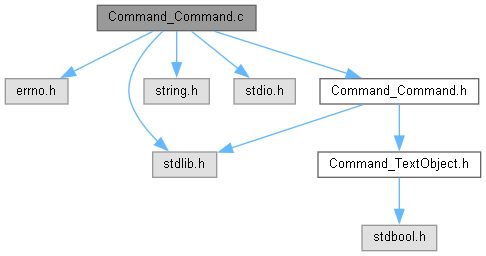Implementation of the Command structure and associated functions as used in the Command Pattern. More...
#include <errno.h>#include <stdlib.h>#include <string.h>#include <stdio.h>#include "Command_Command.h"
Go to the source code of this file.
Functions | |
| Command * | Command_Create_Two_Parameters (const char *commandName, Command_TextObject *receiver, two_parameter_operation operation, const char *arg1, const char *arg2) |
| Create a new Command object with the given parameters, creating a command that uses two additional parameters. | |
| Command * | Command_Create_No_Parameters (const char *commandName, Command_TextObject *receiver, no_parameter_operation operation) |
| Create a new Command object with the given parameters, creating a command that uses no additional parameters. | |
| void | Command_Destroy (Command *commandObject) |
| Destroy the given command object, releasing it and any associated resources. | |
| void | Command_Execute (Command *commandObject) |
| Execute the given command on the Command_TextObject it knows about. | |
| const char * | Command_ToString (Command *commandObject) |
| Convert the given command object to a string representation. | |
Detailed Description
Implementation of the Command structure and associated functions as used in the Command Pattern.
Definition in file Command_Command.c.
Function Documentation
◆ Command_Create_No_Parameters()
| Command * Command_Create_No_Parameters | ( | const char * | commandName, |
| Command_TextObject * | receiver, | ||
| no_parameter_operation | operation | ||
| ) |
Create a new Command object with the given parameters, creating a command that uses no additional parameters.
- Parameters
-
commandName The name of the command (for display purposes). receiver The target or receiver of the command operation. operation The function to call to perform the command.
- Returns
- Returns a new Command object if successful; returns NULL if out of memory
Definition at line 33 of file Command_Command.c.
References Command::commandName, Command::operation_no_parameters, and Command::receiver.
Referenced by Command_ApplyReverseCommand().
◆ Command_Create_Two_Parameters()
| Command * Command_Create_Two_Parameters | ( | const char * | commandName, |
| Command_TextObject * | receiver, | ||
| two_parameter_operation | operation, | ||
| const char * | arg1, | ||
| const char * | arg2 | ||
| ) |
Create a new Command object with the given parameters, creating a command that uses two additional parameters.
- Parameters
-
commandName The name of the command (for display purposes). receiver The target or receiver of the command operation. operation The function to call to perform the command. arg1 The first argument to pass to the command function. arg2 The second argument to pass to the command function.
- Returns
- Returns a new Command object if successful; returns NULL if out of memory
Definition at line 16 of file Command_Command.c.
References Command::argument1, Command::argument2, Command::commandName, Command::operation_two_parameters, and Command::receiver.
Referenced by Command_ApplyReplaceCommand().
◆ Command_Destroy()
| void Command_Destroy | ( | Command * | commandObject | ) |
Destroy the given command object, releasing it and any associated resources.
- Parameters
-
commandObject The Command object to be destroyed. After this function returns, the pointer is no longer valid
Definition at line 48 of file Command_Command.c.
Referenced by Command_Undo().
◆ Command_Execute()
| void Command_Execute | ( | Command * | commandObject | ) |
Execute the given command on the Command_TextObject it knows about.
- Parameters
-
commandObject The Command object to be executed.
Definition at line 56 of file Command_Command.c.
References Command::argument1, Command::argument2, Command::operation_no_parameters, Command::operation_two_parameters, and Command::receiver.
Referenced by Command_Save_And_Execute(), and Command_Undo().
◆ Command_ToString()
| const char * Command_ToString | ( | Command * | commandObject | ) |
Convert the given command object to a string representation.
- Parameters
-
commandObject The Command to be rendered as a string.
- Returns
- A string containing the representation of the command.
Definition at line 74 of file Command_Command.c.
References Command::argument1, Command::argument2, Command::commandName, Command::operation_no_parameters, and Command::operation_two_parameters.
Referenced by Command_ApplyReplaceCommand(), Command_ApplyReverseCommand(), and Command_Undo().